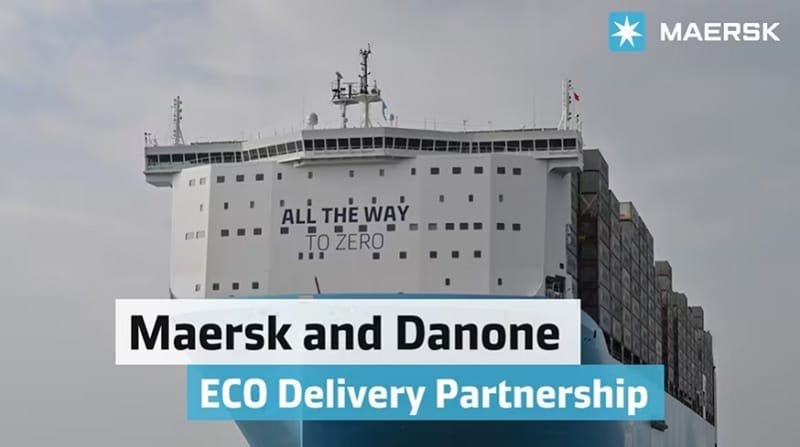Maersk has announced a strategic partnership with Danone, one of the world’s leading food and beverage companies, to significantly reduce greenhouse gas (GHG) emissions in Danone’s logistics operations.
The partnership centers on Maersk’s ECO Delivery Ocean, a product specifically designed to reduce GHG emissions through the use of biofuels like biodiesel and bio-methanol derived solely from waste feedstocks. By using ECO Delivery Ocean, Danone expects to achieve over a 40% reduction in GHG emissions compared to conventional fossil fuels in ocean freight.
This collaboration is part of Danone’s broader “Partner for Growth” program, which focuses on sustainable solutions through key partnerships. The emissions reduction achieved by Maersk’s ECO Delivery Ocean aligns with Danone’s decarbonization strategy. This strategy prioritizes alternative fuels and multimodal transportation to minimize environmental impact.
Jean-Yves Krummenacher, Danone’s Global Chief Procurement Officer, emphasized the significance of this partnership. “The ECO Delivery Ocean product and its reduced greenhouse gas emissions align well with our decarbonization strategy to focus primarily on alternative fuels and multimodal transportation. Maersk is an important partner, and using their product to reduce CO2 emissions on sea freight marks yet another step in our decarbonization journey,” he noted.
The Danone-Maersk partnership extends beyond ocean freight to include a comprehensive inland logistics solution. This solution features dedicated control towers to ensure smooth operations and optimized emissions reduction across the supply chain.
Emilio de la Cruz, Maersk’s Area Managing Director for Southwest Europe, highlighted Danone’s leadership in sustainability. “The swift reduction of greenhouse gas emissions is at the core of both our companies. Well-known companies like Danone can act as a beacon in their industries by using effective levers to decarbonize their supply chains. We are proud to be Danone’s trusted partner in this important task,” he remarked.
Danone’s commitment to net-zero emissions dates back to 2017, when it aligned its goals with the Science-Based Targets initiative (SBTi) as part of its target to reach net zero by 2050. Maersk, with an even more ambitious target of achieving net zero across its entire operations by 2040, was the first logistics company to have its pathway to net zero approved by the SBTi.
With a network spanning over 130 countries and approximately 100,000 employees, Maersk is committed to developing low-emission solutions, innovative technologies, and new vessel designs to decarbonize global logistics.
This partnership highlights the importance of collaborative efforts to achieve meaningful GHG reductions and represents a significant step forward in the maritime industry’s decarbonization journey.
About Maersk
A.P. Moller – Maersk is a leading integrated logistics company focused on connecting and simplifying its customers’ supply chains. With a global presence in over 130 countries and a workforce of around 100,000, Maersk is pioneering the logistics industry’s transition toward net-zero emissions, with a target of achieving this goal by 2040 across its entire operations. Maersk’s ECO Delivery solutions underscore the company’s commitment to innovation and environmental sustainability.
Source Maersk

